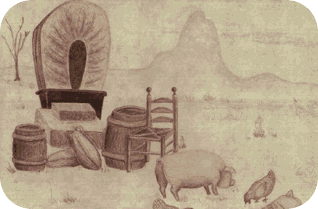 Plenty of things can only exist in a vacuum. Anti-matter. Hell yeah, that stuff doesn’t like being around other stuff. Picking up really hot chicks. Apparently it can only happen in the absence of anyone who can back you up when you boast about it later.
Plenty of things can only exist in a vacuum. Anti-matter. Hell yeah, that stuff doesn’t like being around other stuff. Picking up really hot chicks. Apparently it can only happen in the absence of anyone who can back you up when you boast about it later.
So it’s no surprise to see the current trend of food books: ingredient specialization. Not for these, the concept of focusing on one cuisine, one preparation, or even one dish. The idea of this genre is to choose one specific ingredient X and show how X, and X alone, has sculpted the human race into what it is today.
They each sound pretty convincing. After all, lots of ingredients are universal, and food, or lack of it, has probably had a much greater impact on history than we realize. But there just can’t be a dozen different ingredients where each is the only one to affect human experience. No really, I took high school physics.
Now, I appreciate that taking a sensationalist stance is, academically speaking, the only way to get tenure. But this doesn’t need to be a culinary version of the mêlée over which culture first found America (currently in the running: Basque, Flemish, Chinese, Viking, Spanish, Portuguese, Scottish, and of course, folks from Atlantis). Let’s just calmly sit down and agree that the food most responsible for human history is going to be water.
Salt . Mark Kurlansky argues that salt is the sole cause for early agriculture, trade routes, wars, and modern law. With recipes.
The Hive. Bee Wilson argues that honey is the sole cause for early agriculture, trade routes, wars, and modern law. With recipes.
History of Bread. Bernard Dupaigne argues that bread is the sole cause for early agriculture, trade routes, wars, and modern law.
Cod. Mark Kurlansky argues that cod is the sole cause for early agriculture, trade routes, wars, and modern law. Yes, it’s the same guy who wrote salt, so he must know that they can’t both be right. The only mitigating fact is I think, historically, folks used a lot of salt on cod.
-
17Nov


3 Responses
I read Salt and I’m wishing I stopped partway through. The first 200 pages were fascinating (for this nerd). But the books is roughly 1 billion pages long.
Ten pages into Cod I realized I was headed down the same path and bailed.
Also:
‘Sugar’ – Civilization, Slavery, War, etc…
The Nation’s First Fish – It’s about Shad, American Civilization, War, Etc…
One about beer that I can’t remember off the top of my head and two about Rum that came out this year.
-WDC
One day, I’m going to write a book about how oatmeal predicated the New Deal and the space race.
I hope one of my descendants is a Funyons scholar.